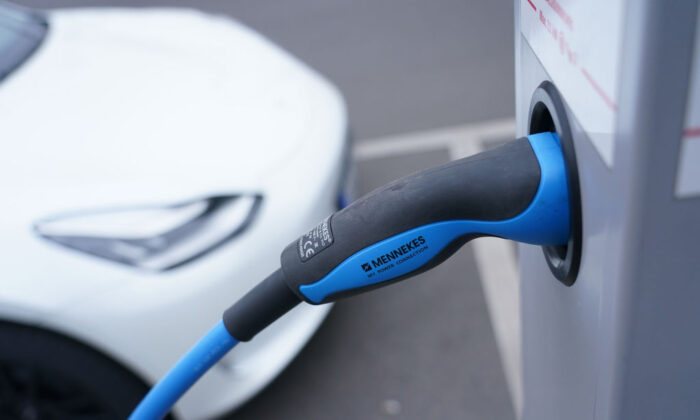Canada will need 200,000 public chargers for electric vehicles (EVs) just to have a ratio of one charger to 24 EVs. The infrastructure required just to power these cars will cost an estimated $20 billion over the next three decades, a new report produced by the federal government concludes.
All of this is required to meet the mandates put in place by Canada’s Liberal government. By 2035, 100 percent of new light-duty car sales must be electric cars, the feds say. A reported $3.3 billion has already been spent on rebates and subsidies since 2016, according to Blacklock’s Reporter.
To achieve the target of 100 percent market share for EV sales by 2035, sales would need to go from the current 5 percent, to 15 percent of all new vehicle sales by 2025, and then to 60 percent of all new sales five years later, by 2030.
5 Percent Drive Electric Cars
This is quite a dramatic increase, considering that the large majority of Canadians seem uninterested in purchasing EVs. Only 5 percent of Canadians surveyed indicate they currently own or lease an EV, according to a Nov. 15, 2021 report on how the country’s citizens view zero-emission vehicles (EVs). Ninety-five percent of Canadians surveyed did not have an EV, and 43 percent responded they did not intend to purchase one.
Electric vehicles still face a number of hurdles with technology, due to charging limitations, winter conditions, and the geographic spread of the country. Charging stations between large cities and the considerable distance it takes to travel across Canada will require a significant investment in new infrastructure.
“Infrastructure along highway corridors is essential to ensure connectivity. The long distance between populated areas in Canada means many of these corridors do not serve high volumes,” said the report.
“As temperatures move towards the cold or hot extremes there are negative impacts on vehicle and battery efficiency resulting in greater charging needs,” added the report.
Home Charge Issues
A number of households will also not have access or ability to home charge an EV, noted the report, suggesting “public charging infrastructure can potentially serve as a substitute.” It will cost more, however, the report acknowledges. “While this is typically less convenient and more expensive than charging at home, it may be the only option for some households.”
The report, Canada’s Public Charging Infrastructure Needs: Updated Projections, does not calculate what portion of expenses for new EV charging stations would require funding from the feds.
The government has implemented EV targets as part of climate plans, and claims transportation causes 25 percent of emissions. According to the government, Canadians need to make the switch to “pollution-free electrified transportation.”
Most Canadians are not sold on buying an electric car. Most EVs in Canada are purchased in Vancouver, Toronto, and Montreal, according to Statistics Canada.
From July 11 to 15, the federal government announced major spending on EV and charging infrastructure, including:
- $4.6 million to Hydro-Québec to help support the installation of up to 840 EV chargers across Quebec
- $3.95 million to Shell Canada to install 79 EV chargers across 37 retail locations along critical corridors in Alberta, British Columbia, Manitoba, Ontario, and Saskatchewan
- $2 million to the government of Prince Edward Island’s Ministry of the Environment, Energy, and Climate Action to support the installation of up to 250 EV chargers on the island
- $2 million to Manitoba Motor Dealers Association to install up to 300 EV chargers across Manitoba in public places, multi-family residences, and workplaces and for light-duty vehicle fleets
- $1.7 million to the BC Ministry of Transportation and Infrastructure and the City of Burnaby to install 128 EV chargers in Burnaby, and across British Columbia
- $765,000 to Peak Power Inc. to install 117 EV grid-smart chargers across Ontario, across mixed-use developments
- $560,000 to Eco-West Canada to install up to 100 EV chargers in Manitoba and Saskatchewan in public places, on-street, in multi-family buildings, and workplaces, or for light-duty vehicle fleets
- $414,000 to the government of the Northwest Territories to help support the installation of up to 72 EV chargers across the Northwest Territories
- $350,000 to the New Brunswick Power Corporation to install in workplaces 52 EV chargers across New Brunswick
- $55,000 to Southwest Properties Limited to install 20 EV chargers in Halifax, Nova Scotia

